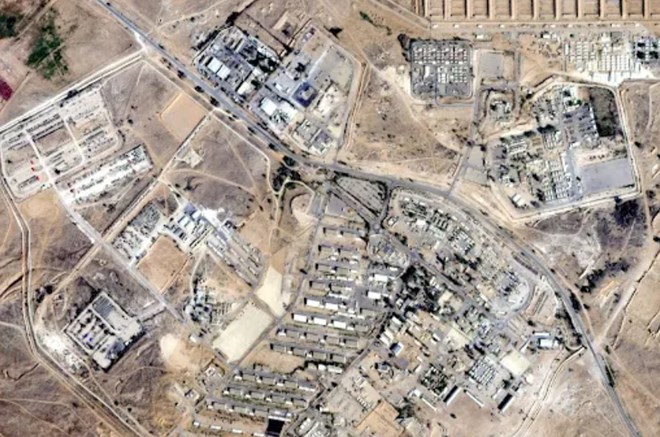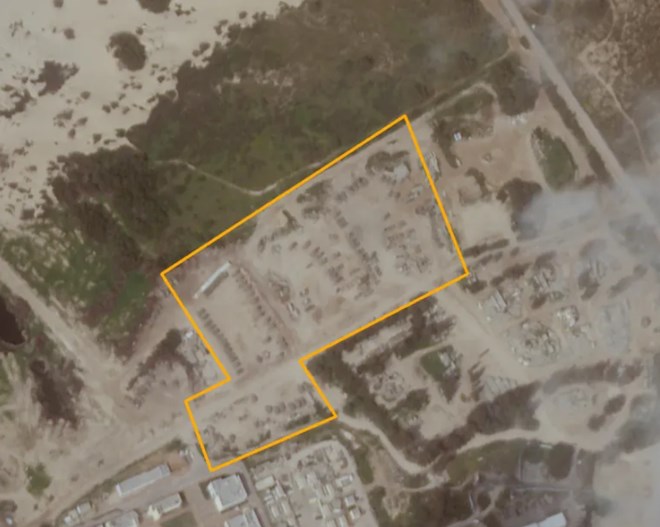
Tuesday April 23, 2024

More than 700 military vehicles are distributed within the Tze'elim military base, approximately 29km (18 miles) from Khan Younis city and 30km (18.6 miles) from Rafah [Planet Labs PBC]
Israel looks ready to escalate its devastating war on Gaza after stationing troops and vehicles at nearby army bases and outposts just outside the enclave, according to satellite imagery obtained and assessed by Al Jazeera’s Sanad verification unit.
The analysis indicates that Israel has deployed more than 800 military vehicles to two bases. At least 120 vehicles are stationed at the northern border of the Gaza Strip and 700 are in the Negev desert, to the south.
The satellite imagery also reveals that Israel has established nine military outposts just outside the enclave. Three were erected in November and December 2023 and six were set up between January and March of this year. The outposts house soldiers, operational command centres and military vehicles.
The findings indicate that Israel plans to continue its war on Gaza, which was launched after Hamas’s surprise attack on Israeli communities and military outposts on October 7, despite global condemnation.
Israel’s war has killed nearly 35,000 Palestinians in Gaza, displaced most of the population and destroyed 62 percent of all homes.
According to Israeli officials, about 1,139 people were killed in Hamas’s October 7 attack and about 250 were taken captive.
Al Jazeera’s satellite analysis supports the view of several experts who say Israel will dedicate most of its military resources to its campaign in Gaza, despite having withdrawn the majority of its forces from the enclave in recent weeks.
“My general sense is that the [Israeli] security establishment would be more likely to prioritise finishing off Gaza, then shifting to other threats – whether that be [the Lebanese group] Hezbollah or Iran,” said Hugh Lovatt, an expert on Israel-Palestine with the European Council of Foreign Relations (ECFR).
Extracting a priceOn April 18, US and Israeli officials met to discuss a possible operation in Rafah, a town on the border with Egypt currently providing relative safety to more than 1.4 million Palestinians displaced within the enclave.
The meeting followed rumours that the United States would support a full-scale invasion of Rafah – having previously expressed public reservations – in return for assurances that Israel would not escalate its tit-for-tat attacks with Iran.
US officials have denied those reports, but Israel does have more leverage to attack Rafah by dangling the spectre of regional escalation, according to Omar Rahman, an expert on Israel-Palestine at the Qatar-based Middle East Council for Global Affairs.
“The Israelis have made an art form out of extracting a price for doing something or not doing something, whether they actually intended to do it or not,” he told Al Jazeera
Israeli Prime Minister Benjamin Netanyahu will also attempt to leverage Iran’s attack on Israel to consolidate his domestic position, experts said.
On April 14, Iran fired hundreds of drones and missiles at Israel in retaliation for an Israeli strike on its consulate in the Syrian capital, Damascus. Iran warned of its attack days in advance, and Israel and allied countries shot down almost all incoming strikes.
Days later, Israel appeared to respond with a minor strike on Iran’s Isfahan airbase, which also hosts nuclear facilities. While Iran played down the strike and Israel has not publicly commented on it at all, in perhaps an effort from both sides to de-escalate tensions, Israel has reiterated its plans to attack Rafah.
“I think because of the fear [among regional allies] to escalate with Iran – which is the nightmare scenario that people could envision – they are more attentive to alternative options,” said Eyal Lurie-Pardes, an Israel-Palestine expert with the US-based Middle East Institute.
“That’s why Netanyahu is trying to leverage the diplomatic position he’s in to pursue his ambition to conquer Rafah and to move ahead with an operation there.”

An analysis of satellite imagery shows the presence of approximately 120 military vehicles at the Zikim base, on the northern side of the border with Gaza [Planet Labs PBC]
‘Drumming up false beliefs’
Israel’s recent attacks and warnings in Gaza have raised fears of a larger offensive on Rafah.
Over the weekend, Israeli air attacks killed at least 22 people, including 18 children, in the southern city, Palestinian health officials said.
Mairav Zonszein, an expert on Israel-Palestine for the Belgium-based International Crisis Group, told Al Jazeera that Israel had always planned to invade Rafah, irrespective of US backing for its operations.
She added that Netanyahu has a habit of drumming up a false belief that he will not do something to secure leverage or support on other issues, citing the prime minister’s previous agreement to pause the de-facto annexation of the occupied West Bank in exchange for signing peace deals with various Arab governments.
“Israel was still annexing [the West Bank] and it is still doing it, but it got the accords,” Zonszein said. “For the most part, Israel just does what it wants and [US President] Biden has either fallen for it or just isn’t up to the task to [pressure Israel] not to do things.”
Lurie-Pardes also believes that Netanyahu will not be deterred from invading Rafah and that the operation is coming sooner rather than later, corresponding with Al Jazeera’s satellite analysis.
“Netanyahu won’t give up this position – or leverage – which he has right now [to go into Rafah],” Lurie-Pardes said.
SOURCE: AL JAZEERA